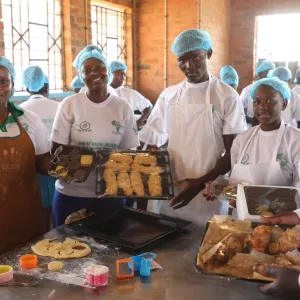Transforming Wheat into Opportunity
Once considered just a simple grain, wheat in Zimbabwe is now part of a broader story—one of innovation, entrepreneurship, and local resilience. 10-12 September 2025 – At SOS Hermann Gmeiner High School in Bindura, students, teachers, farmers, and researchers gathered for a workshop on wheat value addition, turning classrooms into laboratories of creativity. The event was organized by the Directorate

Transforming Wheat into Opportunity
Once considered just a simple grain, wheat in Zimbabwe is now part of a broader story—one of innovation, entrepreneurship, and local resilience.
10-12 September 2025 – At SOS Hermann Gmeiner High School in Bindura, students, teachers, farmers, and researchers gathered for a workshop on wheat value addition, turning classrooms into laboratories of creativity. The event was organized by the Directorate of Research, Education and Specialist Services (DRESS) under the Ministry of Lands, Agriculture, Fisheries, Water and Rural Development (MLAFWRD), with support from the African Development Bank (AfDB) through the Technologies for African Agricultural Transformation (TAAT) Wheat Compact, led by ICARDA under AfDB’s Feed Africa strategy.
The training, “Wheat Value Addition: Enhancing Quality, Increasing Profitability,” brought together 80 students, educators, farmers and agricultural development partners to explore how to take Zimbabwe’s wheat beyond bread.
From Wheat Fields to Kitchen Labs
Participants learned to transform locally produced wheat into a range of nutritious, value-added products, including pumpkin pie, baobab-flavoured cake, moringa buns, rosella muffins, and even millet-wheat blends. Combining wheat with indigenous ingredients such as moringa, baobab, and rosella showed that real innovation often begins when tradition meets experimentation.
The workshop also introduced participants to branding, packaging, and marketing, empowering young people to see wheat as a business opportunity. Women entrepreneurs were central to the sessions, reflecting TAAT’s commitment to inclusive agricultural transformation where women and youth lead value addition and enterprise creation.
This local initiative in Bindura is part of TAAT-Wheat’s broader capacity-building effort across six African countries, including Ethiopia, Kenya, Mali, Sudan, Tanzania, and Zimbabwe, where more than 7,500 people were trained in 2024 alone. These training-of-trainers programs focused on good agricultural practices, post-harvest handling, seed production, value addition, and rural enterprise development, ensuring that skills acquired in classrooms and field schools ripple through communities long after the sessions end.
“Through TAAT, we’ve shown that when national programs, research institutions, and farmers work in tandem, Africa’s wheat potential becomes reality. Better seed starts the story, but it’s the systems around it that ensure the story never ends.” – Dr. Zewdie Bishaw, Research Team Leader – Seed Systems, International Nurseries and Seed Health and ICARDA’s Coordinator of the TAAT II Wheat Compact.
Building Value Chains
Zimbabwe’s wheat production has soared in recent years, rising from 426,000 tons in 2022 to over 550,000 tons in 2023 and surpassing 600,000 tons in 2025. Yet, as the workshop highlighted, true economic transformation happens when raw produce becomes market-ready products. A single bucket of wheat may generate US$6, for example, but once processed into bread, cakes, or biscuits, its value can increase nearly tenfold.
Today’s success builds on a strong foundation of research and technology deployment. One standout example is the SAVE wheat variety, developed by ICARDA in collaboration with Zimbabwe’s DRESS. Released in 2022 and adopted nationally in 2023, SAVE is tolerant to heat, drought, and rust and can be grown in both summer and winter, allowing farmers to cultivate wheat year-round. In 2023, Zimbabwe harvested 468,000 tons of wheat from 90,186 hectares, exceeding its national self-sufficiency target by 30%, a milestone supported by the widespread adoption of resilient varieties such as SAVE. In 2025, about 112,000 ha were cultivated during winter and summer production, reaching over 600,000 tons of wheat.
Youth Leading Zimbabwe’s Wheat Future
The impact of the training was immediate and inspiring. The school tuck shop now sells a range of wheat-based snacks, generating income while giving students hands-on experience in agribusiness. Farmers and parents have begun experimenting with new wheat varieties and products, while innovation platforms are connecting breeders, millers, processors, and private-sector actors to sustain momentum across the value chain.
For ICARDA and TAAT, this initiative exemplifies the power of research partnerships to translate improved technologies into community-led solutions. By engaging schools as innovation hubs, Zimbabwe is cultivating not only crops but also a new generation of agri-entrepreneurs ready to transform Africa’s food systems.
As one student put it:
“We came to learn how to bake bread. We’re leaving knowing how to build businesses.”
About TAAT-Wheat
The Technologies for African Agricultural Transformation (TAAT) Wheat Compact, led by ICARDA, supported by the African Development Bank, promotes the adoption of improved wheat technologies across Africa. Through partnerships with national programs, TAAT is driving the continent’s journey toward wheat self-sufficiency by enhancing productivity, value addition, and market linkages, empowering farmers, women, and youth to turn grain into gain.

